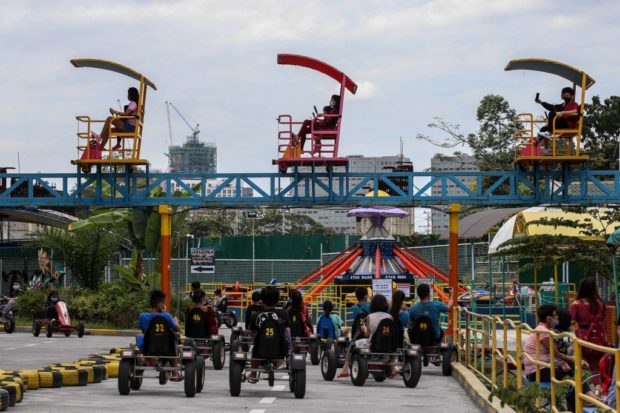Mass testing pushed as PH logs 4,600 new COVID-19 cases

People visit a park in Quezon City, east of Manila on New Year’s Day on January 1, 2022. (Photo by Jam STA ROSA / AFP)
MANILA, Philippines — The surge in new COVID-19 cases due to the easing of quarantine restrictions during the Christmas holidays picked up pace as the Department of Health (DOH) on Sunday reported 4,600 new infections, or almost double in just the past three days.
About one in five of the 26,122 individuals tested on Dec. 31 was infected, raising the country’s positivity rate to a high 19.6 percent, according to the DOH.
This was up by nearly twentyfold from only 0.9 percent only 11 days ago and way above the 5-percent threshold of the World Health Organization to indicate that the spread of the coronavirus is under control. A high positivity rate also means that more testing should be done since it suggests that there may be more people infected with the disease in the community who have yet to be detected.
The daily tally from the DOH seemed to mirror the fear of public health experts that the Philippines would soon suffer the fate of the United States and many countries in Europe, which are now battling the latest surge in COVID-19 cases due to the highly transmissible Omicron variant of the virus.
‘Exponential growth’
The DOH earlier warned the public of a “high probability of exponential growth” in virus cases following the confirmed cases of the Omicron strain in the country.
A total of 14 Omicron cases have already been documented in the country, three of which were transmitted locally.
In its latest bulletin, the DOH said the country’s active cases, or the number of people still afflicted with the virus, were now at 21,418, the highest since the 22,070 active cases recorded on Nov. 20.
“Of the 4,600 reported [new] cases, 4,548 occurred within the recent 14 days,” the DOH said in its bulletin. It said two laboratories did not operate on Dec. 31 while nine others failed to submit their data to the COVID-19 Document Repository System.
As seen in the past several weeks, most of the new infections were recorded in the National Capital Region with 3,279, followed by Calabarzon (676) and Central Luzon (252).
Pateros, which was COVID-free for nearly three weeks, has logged 36 new COVID-19 infections, prompting Mayor Miguel Ponce III to order the closure of basketball courts and discourage activities that require the removal of masks such as contact sports in Metro Manila’s smallest local government.
Two hospitals in the city of Manila also had to temporarily close due to the increasing number of COVID-19 cases.
Justice Jose Abad Santos General Hospital in Binondo, Manila, announced in a statement on Saturday that the number of COVID-19 patients exceeded the number of available beds so it needed to temporarily close to transfer some patients to quarantine facilities.
Gat Andres Bonifacio Memorial Medical Center in Tondo, Manila, also announced that it would stop admitting COVID-19 patients in the emergency room for the time being due to a spike in infections among its staff.
As of Sunday, the total number of active COVID cases in the capital city was 544 while its six district hospitals recorded a 35-percent occupancy rate.
Heightened restrictions
The spike in infections has already prompted the government to tighten quarantine restrictions. On New Year’s Eve, acting presidential spokesperson Karlo Nograles announced that Metro Manila would revert to the stricter alert level 3 from Jan. 3 to 15 following the surge in COVID-19 cases.
Philippine National Police chief Dionardo Carlos on Sunday said that placing Metro Manila on alert level 3 could help the police control the movement and unnecessary gathering of people.
In particular, he said the PNP could concentrate on beefing up security in areas placed under granular lockdown.
Since November last year until Jan. 1, the PNP has accosted some 1.3 million people across the country for violations of minimum public health standards. More than a million violators were given warnings, another 135,000 persons were fined and more than 84,679 were cuffed for other offenses or made to render community service.
Carlos said the PNP itself was grappling with its own problem of increasing new infections, reporting a steady increase in daily new COVID-19 cases since Dec. 28 last year, after 10 days of reporting almost zero cases from Dec. 18 to 27.
On Dec. 28, the PNP reported four new cases, which doubled the next day. On Dec. 30 there were four new cases and five on New Year’s Eve. On the first day of 2022, the PNP reported 12 new infections and on Sunday another 14.
An opposition lawmaker has also pressed the government to conduct free mass testing and aggressive contact tracing following the sudden surge in infections due to the more contagious Omicron variant.
House Deputy Minority Leader and Bayan Muna Rep. Carlos Isagani Zarate on Sunday urged Malacañang “to implement the much inadequate, even delayed, but still crucial” free COVID-19 mass testing, proactive contact tracing, and a faster and more efficient vaccine rollout.”
We strongly call on President Duterte to finally listen to the oft-repeated but unheeded call for free mass testing because the Covid surges are becoming a vicious cycle,” Zarate said.
The record P5.024-trillion 2022 national budget signed by President Duterte on Dec. 30 has actually allotted funds for mass testing and contact tracing.
Marikina Rep. Stella Quimbo, a member of the House contingent to the bicameral conference committee on the 2022 national budget, told the Inquirer that P250 million under the Department of the Interior and Local Government was allocated for contact tracing.
Quimbo added that P1 billion under the unprogrammed fund would be used for the hiring of contact tracers.